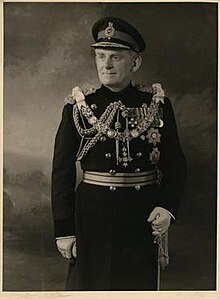| Sir John Anderson | |
|---|---|
 General Sir John Anderson General Sir John Anderson | |
| Born | (1908-09-23)23 September 1908 Downpatrick, Ireland |
| Died | 16 April 1988(1988-04-16) (aged 79) Ealing, London |
| Allegiance | United Kingdom |
| Service | British Army |
| Years of service | 1929–1968 |
| Rank | General |
| Service number | 42399 |
| Unit | 5th Royal Inniskilling Dragoon Guards |
| Commands | Imperial Defence College Royal Armoured Corps 11th Armoured Division |
| Battles / wars | Second World War |
| Awards | Knight Grand Cross of the Order of the British Empire Knight Commander of the Order of the Bath Distinguished Service Order |
General Sir John D'Arcy Anderson, GBE, KCB, DSO (23 September 1908 – 16 April 1988) was a British Army officer who reached high office in the 1960s.
Early life
John D'Arcy Anderson was born on 23 September 1908 in Downpatrick, Ireland, the only son of Reginald D'Arcy Anderson. He was educated at Winchester College and New College, Oxford.
Military career
Anderson was commissioned into the 5th Royal Inniskilling Dragoon Guards in 1929. He served in the Second World War in France, the Middle East and Italy.
After the war Anderson was appointed commanding officer of the 25th Armoured Brigade in 1952, promoted to General Officer Commanding 11th Armoured Division in Germany in 1955 and then became Chief of Staff at Headquarters Northern Army Group and British Army of the Rhine in 1956. He became Director of the Royal Armoured Corps in 1958 and Director General of Military Training at the War Office in 1959.
Anderson was appointed Deputy Chief of Imperial General Staff in 1961 and Military Secretary in 1963. Finally he became Commandant of the Imperial Defence College in 1966; he retired in 1968. He was appointed a Knight Commander of the Order of the Bath in the 1961 New Year Honours.
Anderson was also the first Colonel Commandant of Ulster Defence Regiment from 1969 to 1979. In that capacity he escorted the Queen during her Silver Jubilee visit to Northern Ireland in 1977. A purpose-built operations centre for the UDR was built at Ballykinler army base and named in honour of the general who was known as "The father of the UDR".
From 1962 to 1967 Anderson was Colonel of the 5th Royal Inniskilling Dragoon Guards.
Public service
Anderson was appointed High Sheriff of County Down for 1974.
Family life
Anderson married Elizabeth Antoinette Merrifield Walker. They had no children.
References
- England & Wales, Civil Registration Death Index, 1916–2007
- "Deaths". The Times. 19 April 1988.
- ^ "Reginald D'Arcy Anderson (1880–1917)". Retrieved 15 August 2012.
- ^ Liddell Hart Centre for Military Archives
- "No. 42231". The London Gazette (Supplement). 27 December 1960. p. 8891.
- Victor Patterson
- The Ulster Defence Regiment: An Instrument of Peace?, Chris Ryder 1991 ISBN 0-413-64800-1 p70
- "5th Royal Inniskilling Dragoon Guards". Regiments.org. Archived from the original on 27 February 2007. Retrieved 6 August 2016.
{{cite web}}: CS1 maint: bot: original URL status unknown (link) - "No. 2968". The Belfast Gazette. 11 January 1974. p. 13.
External links
| Military offices | ||
|---|---|---|
| Preceded byHarold Pyman | GOC 11th Armoured Division 1955–1956 |
Succeeded byReginald Hewetson |
| Preceded bySir Harold Pyman | Deputy Chief of the Imperial General Staff 1961–1963 |
Succeeded bySir John Hackett |
| Preceded bySir William Stirling | Military Secretary 1963–1966 |
Succeeded bySir Richard Goodwin |
| Preceded bySir Deric Holland-Martin | Commandant of the Imperial Defence College 1966–1968 |
Succeeded bySir Donald Evans |
- 1908 births
- 1988 deaths
- Military personnel from County Down
- People from Downpatrick
- People educated at Winchester College
- Alumni of New College, Oxford
- British Army generals
- British Army brigadiers of World War II
- Knights Grand Cross of the Order of the British Empire
- Knights Commander of the Order of the Bath
- Companions of the Distinguished Service Order
- 5th Royal Inniskilling Dragoon Guards officers
- High sheriffs of Down